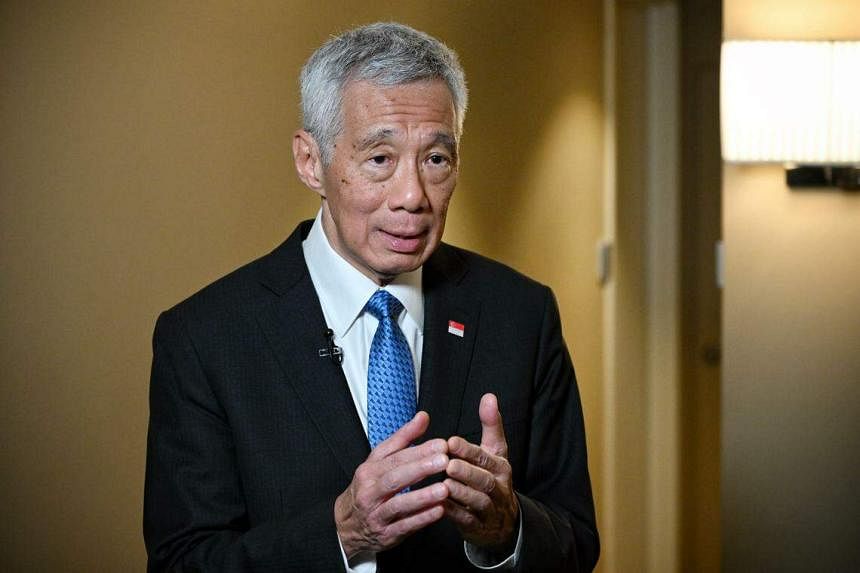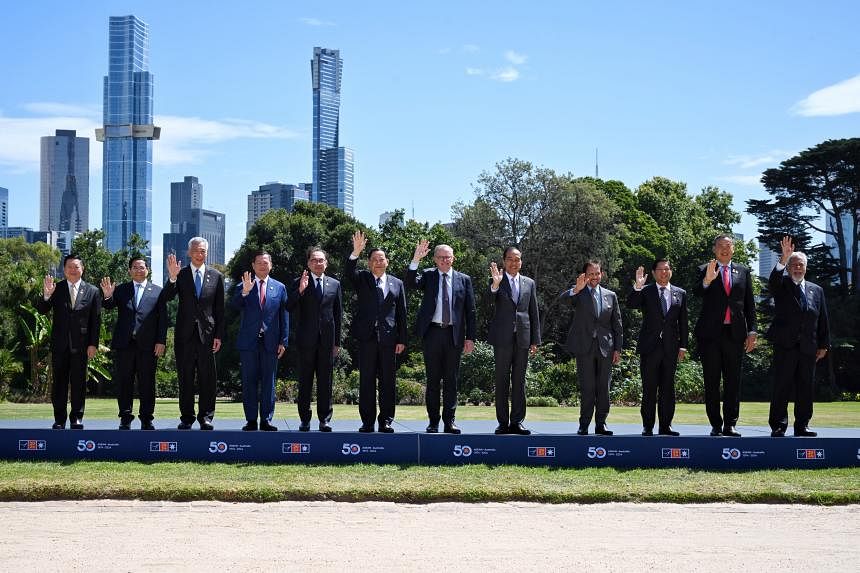MELBOURNE - Australia is well positioned to support Asean’s efforts to maintain regional peace and stability as the great power rivalry between the United States and China plays out in South-east Asia, Singapore’s Prime Minister Lee Hsien Loong said on March 6.
“Both Australia and Asean are doing our best to preserve regional peace and stability because we know full well that conflict in the region would affect us directly, and undermine the progress and development that has taken us decades to achieve,” he said.
In a speech during the Asean-Australia Special Summit in Melbourne, he said major countries are actively making moves and growing their influence in the region.
Individual countries are in turn positioning themselves in the hope of gaining benefit or to avoid being “caught in between”.
“But despite different strategic situations and perspectives, regional countries all share an interest in the peace and prosperity of South-east Asia and the broader Asia-Pacific region,” said PM Lee.
Touching on the different relationships that Asean members or partners have with the major powers, he said that some are treaty allies of the US, while others are more closely aligned with China due to strategic situations or historical developments.
Others, like Singapore, do their best to remain “good friends” with both major powers.
“In fact, this has been Asean’s longstanding aim: to expand areas of commonality while acknowledging our differences,” PM Lee added.
As Australia has longstanding ties in South-east Asia, all regional countries accept it as an Asian power, he said, noting that the Melbourne summit – which marked 50 years of relations between the partners – was a show of Australia’s clear commitment to Asean that has been consistent through successive Australian administrations.
Speaking to Singapore’s media shortly after the end of the summit, PM Lee said Australia had always been a country with deep and vested interests in the region, with ties in areas like trade and security.
“It affects their security because if anything goes wrong in South-east Asia or Asia, that’s going to impact on Australia. And it’s an area where a lot of their trade goes through,” he said, adding that the region has benefited from Australian involvement dating back to World War II.

Australia has had a relationship with Asean since 1974 and is the bloc’s first and oldest dialogue partner.
In the same vein, Asean-led mechanisms, such as the Asean Regional Forum and the East Asia Summit, were set up “precisely” for the purpose of dialogue and cooperation with major powers that have interests in the region, PM Lee said.
Highlighting the East Asia Summit – a forum where the heads of states and governments of all key partners meet to discuss political, security and economic challenges facing the Indo-Pacific – he said Australia should work with Asean to boost the effectiveness of the annual gathering.
The East Asia Summit includes the US and China, as well as Australia, India, Japan, New Zealand, Russia and South Korea.
“(The summit’s) role has been somewhat circumscribed by big power tensions. Nevertheless, it remains the most inclusive and appropriate forum to discuss strategic, security and economic issues concerning the region,” said PM Lee.
During the Melbourne summit, Australian Prime Minister Anthony Albanese outlined the country’s tangible commitments to Asean such as the establishment of an Asean-Australia Centre in Canberra to build on business, education and community ties, and additional scholarships for students from Asean member nations.
PM Lee said such efforts by Australia will build knowledge and understanding of Asean priorities, and allow for the building of concrete partnerships that contribute to regional stability and growth.
“In this way, we can mitigate the impact of major power rivalry on the region, and somewhat reduce the risk of a spiral into open conflict,” he said.
Such efforts will create a regional climate that makes it easier to address acute challenges, said PM Lee, who in his speech also focused on the South China Sea dispute and the conflict in Myanmar.
There has been a recent heightening of tensions in the South China Sea, one of the world’s most crucial waterways, largely due to increasingly intense clashes between the Philippines and China, which have overlapping claims over parts of it.
China claims sovereignty over virtually the entire South China Sea, although a United Nations tribunal found this to be without legal basis in 2016.
“We hope that all parties will work towards preserving regional peace and stability, and will keep their actions in line with international law, including the 1982 Unclos (United Nations Convention on the Law of the Sea),” he said.
Meanwhile, the situation in Myanmar has deteriorated and PM Lee said it was hoped that Asean could work with its external partners, such as Australia and the UN, to facilitate dialogue and reconciliation in the country.
“It will be patient work, but it is worth making our best effort to do it,” he said.
During the course of the three-day summit, the Albanese government announced several clean energy, maritime and infrastructure initiatives targeted at boosting collaboration and stability in the region.
“Asean binds our region together, and I can say with confidence that our partnership has never been stronger or more consequential to our mutual prosperity and to the stability of the region we call home,” said Mr Albanese.
Following the conclusion of the summit, a joint statement issued by Australia and Asean expressed concern over the “dire” humanitarian situation in Gaza. It also called for the release of hostages captured by Palestinian militant group Hamas.
“We condemn attacks against all civilians and civilian infrastructure that lead to further deterioration of the humanitarian crisis in Gaza, including restricted access to food, water, and other basic needs,” the statement said.
“We urge for an immediate and durable humanitarian ceasefire.”
Nations at the summit were reportedly split over whether the statement should call for a total ceasefire or a temporary “humanitarian” pause.


